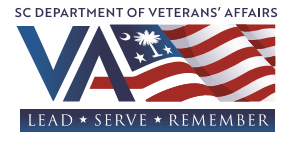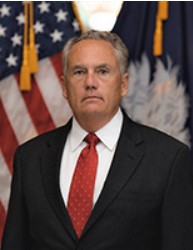

COLUMBIA, S.C. - After devoting its first year under the inaugural Secretary to a close examination of Veteran services across the state, the South Carolina Department of Veterans’ Affairs (SCDVA) is making some recommendations about both the scale and scope of those services, and the manner in which they are delivered.
These recommendations are informed by and aligned with those provided by the Joint Committee to Study Certain Issues Pertaining to Veterans, a General Assembly-directed study who reported its findings to the Governor and General Assembly on 31 January 2021.
The recommendations of both the Department and the Joint Committee reflect two central truths about South Carolina’s Veterans.
The first is that, although the vast majority of South Carolina Veterans are well-adjusted contributors to their communities, all Veterans face risks. These vary by individual and include a wide array of interconnected areas such as employment, physical health, mental health, homelessness, incarceration, intimate partner violence, and a host of others. Addressing these risks requires holistic solutions tailored to the individual Veteran and his or her local environment.
The second is that the availability of such holistic, tailored care varies widely from county to county across the state. Some county offices are models of Veteran service, literally serving as a single touch point through which Veterans gain access to a wide array of services and programs (federal, state, non-profit, etc.) which can be tailored to the individual needs of the Veteran. Many county offices lack the resources and connections to make this a reality. Rural counties in particular struggle to generate adequate resources for their Veterans Affairs Offices. Today, the level of service a Veteran receives is largely determined by the county office to which he or she goes for assistance.
The Department of Veterans’ Affairs hopes to change this by establishing common levels of service across the state, training service officers to a common high standard, and more efficiently and effectively aligning resources to needs. To do this, the Department and Joint Committee have proposed an incremental plan to shift responsibility for Veteran services from individual counties to the state-level Department. Additionally, the Department is implementing advances in claims management software, public communications, and outreach to a broader population, especially our younger and female Veterans.

“Change can be challenging,” stated Secretary of Veterans’ Affairs Will Grimsley, “but the reality is that change is necessary if South Carolina is to retain its title as the most military-friendly state in the Union. We owe it to our Veterans to provide a uniformly high level of service, and we owe it to our county service officers to provide them with the training and resources they need to be successful. I am confident this is possible, because we already have some county offices that model this idea today. But the level of service a Veteran receives should not be dependent upon which county office he or she visits.”
The South Carolina Department of Veterans’ Affairs defines success as a Veteran population that is 1) mentally, emotionally, and physically sound; 2) satisfied by the dignified manner in which they are treated by those who provide services; 3) respected by their fellow citizens; and 4) proud of their continuing contributions to the South Carolina community and the Nation. The changes proposed by the Department and the Joint Committee are intended to help the state get closer to this admittedly lofty objective.

